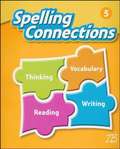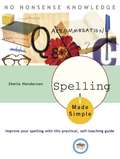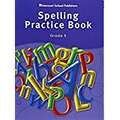- Table View
- List View
Spelling Connections, Grade 7
by J. Richard GentrySpelling Connections acts as a guide for children to learn about spelling, writing and vocabulary.
Spelling Connections: A Spelling & Vocabulary Program, [Grade] 7
by J. Richard GentryNIMAC-sourced textbook
Spelling Connections: Grade 6
by J. Richard GentrySpelling Connections is a valuable resource book for students of Grade 6.
Spelling Made Simple
by Sheila Henderson Stephen V. RossIn answer to the changing needs of today's marketplace, the Made Simple series for the '90s presents a thoroughly up-to-the-minute portfolio of skills, information, and experience, with revised and updated editions of bestselling titles.
Spelling Practice Book (Grade #5)
by HarcourtThis book gives you a place to keep word lists of your own.



